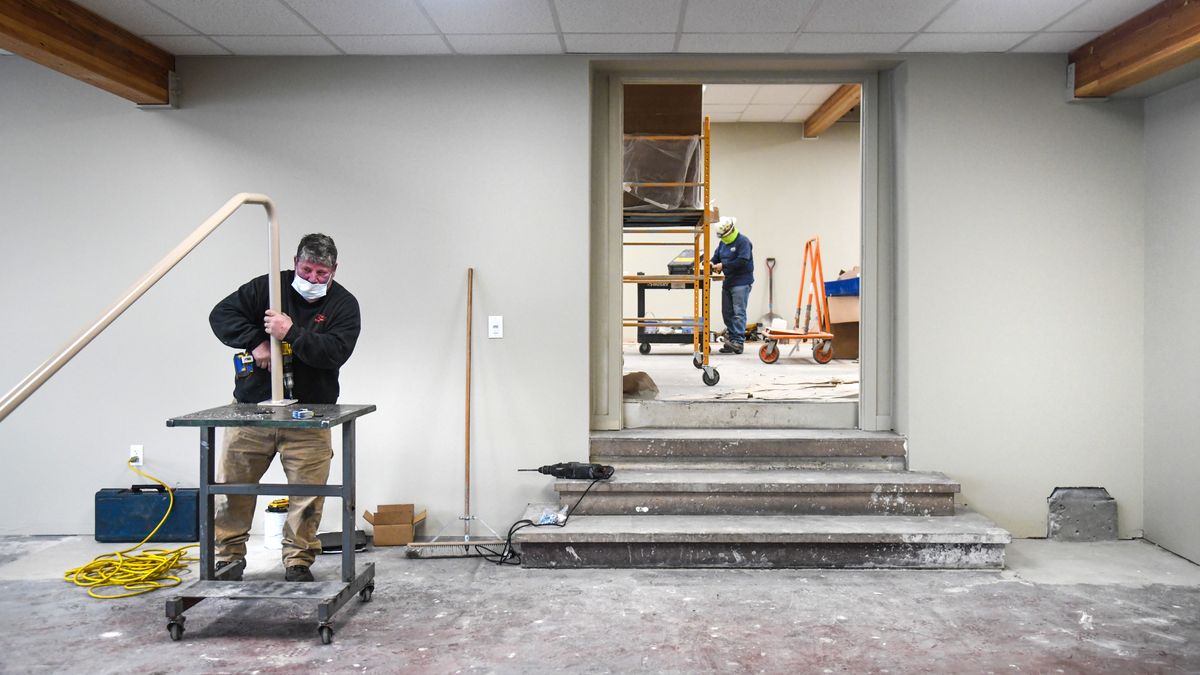Spokane shelters get upgrades with coronavirus aid; Cannon shelter opening imminent

From asbestos to sawdust, Spokane officials say contractors have overcome obstacles to renovate two new shelters for people experiencing homelessness.
This week, the Spokane City Council accepted $900,000 in federal coronavirus aid from Spokane County to fund the unexpectedly arduous construction entailed in opening new shelters on Mission Avenue and Cannon Street, where its warming center is being renovated.
The shelters on Mission Avenue, operated by the Salvation Army, and Cannon Street, which has yet to reopen, both required substantial renovations to meet the goals of a modern facility, according to city officials.
It’s the second investment the county has made in the renovation projects, which now total $1.6 million.
Installation of bathrooms and showers in the Mission Avenue shelter wrapped up this week, and the city expects to be able to partially reopen the Cannon Street warming center in November.
It’s a silver lining of the pandemic. After they provide supplemental, socially distanced shelter this winter, both buildings will be newly renovated and able to serve Spokane’s effort to mitigate homelessness for years to come.
The shelter on Mission Avenue, after the pandemic, will transition to a “Bridge Housing” shelter. Its residents will stay for about 90 days, must be referred there and ready to find more permanent, stable housing.
The Cannon Street shelter will be flexible, used as a warming center in the winter but open for at least some services 12 months a year.
But until this week, neither building had actual bathrooms.
Contractors at the shelters have faced numerous challenges in readying them for use.
The Cannon Street building, which the city purchased last year, was constructed in the early 20th century and consists of three bays, according to city spokesman Brian Coddington.
And like any construction project on a decades-old building, “once you open the walls, you don’t know what you’re going to get,” Coddington said.
What they got was a pile of sawdust in the ceiling. And inside the building’s third bay, once contractors pulled up the flooring, they found work that needed to be done to the foundation.
“We expected something, just didn’t expect all of that,” said Timothy Sigler, director of the city’s Community, Housing and Human Services Department.
Because of the urgency the situation called for, the city eschewed normal procedures in selecting a general contractor. Rather than putting the project out to bid, it selected a contractor it had worked with before, Spokane Valley-based Rockin’ DW Construction.
“We knew that he could deliver on what we needed in a short period of time,” Sigler said.
The building will reopen with its first two bays only, while the third remains under construction. It will have room for about 80 adults.
Once the third bay is open in about a month, the building will be complete with showers and bathrooms for men and women, supplied with water from a new line that was installed to service the building’s increased demand. It’s expected to be a vast improvement over the portable toilets and shower trailers the building has previously relied on to serve guests.
The largest obstacle to the Mission Avenue shelter’s renovation was asbestos found in the flooring, which was mitigated, and the number of walls that had to be knocked down in what was formerly an office space.
The former break room was converted into bathrooms and showers that opened this week.
The new facilities could not come soon enough, as hygiene is at a premium during the coronavirus pandemic.
As winter weather encroached on Spokane last week, the city received criticism for again failing to have its warming center open in time for autumn’s first snowfall.
But from the city’s perspective, it’s meeting the same schedule it has in previous years, despite a pandemic.
It’s a common misconception, Coddington said, that the city was able to enter the Cannon Street building as soon as the city’s contract with Jewels Helping Hands ended on April 1.
Due to the coronavirus pandemic, the city immediately reopened the shelter under a new operator, the Guardians Foundation, which occupied it until a new temporary shelter was opened inside the Spokane Arena at the end of May.
That delay put the city two months behind schedule from the start, Coddington said.
In past years, the Cannon Street shelter has been operated only as a seasonal warming center. After this winter, that will no longer be the case.
Instead, the city will look to sign a year-round contract with a provider that will operate the building as a shelter during the winter, but continue to have a presence there during the warmer months.
But the building could be used, almost at a moment’s notice, as a shelter if needed.